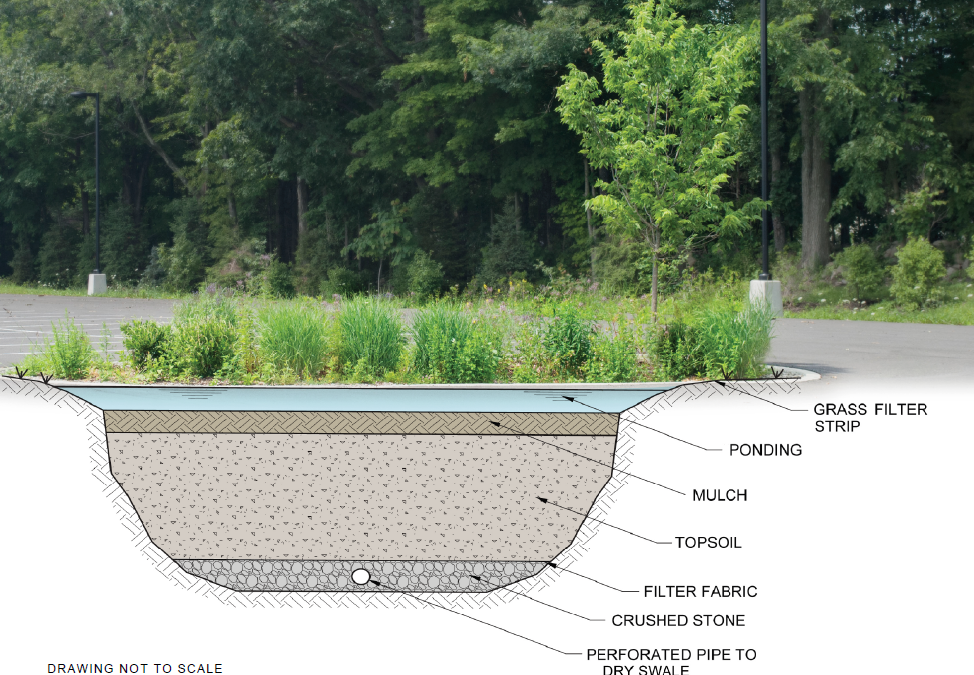The Cotuit Library has a colorful new landmark to improve stormwater management while beautifying the area. Called a bioretention, this feature is similar to the more simplified rain garden that homeowners can build. The garden was installed earlier this year and is one of several stormwater sites being addressed by the Association to Preserve Cod in partnership with the town of Barnstable and Horsley Witten Group.
Above ground in the garden, native plants such as blue flag irises and New England aster attract pollinators, including butterflies, bees and hummingbirds. Below ground, the long roots of these native plants reach deep into the soil, often reaching groundwater, which reduces the need for watering even in periods of drought like this summer. Additionally, these roots absorb excess nutrients originating from septic systems, fertilizers and stormwater runoff from paved and hardened surfaces.
Nutrient pollution remains a problem in many coastal waters and can reduce water quality and harm the fish and shellfish that live there. However, nature-based stormwater features like the one at the Library filter runoff, removing nutrients, as well as sediment, bacteria, oils and other pollutants that can also negatively affect water quality, according to APCC.
“We began this project in 2016, with the goal of installing one or two stormwater treatment systems and providing training and outreach to town staff and the public,” said April Wobst, restoration ecologist at APCC. “However, with new grants and success garnered by strong partnerships, we have now constructed seven stormwater systems in the Three Bays watershed and will be working with the Library on upcoming educational programs.”
“We are having an absolute blast working with the Library on this bioretention” said Michelle West, senior water resources engineer at the Horsley Witten Group. “It is the perfect place for this ‘immersive’ design, which is intended to have kids and adults alike play around, and even in the garden, on stepping stones, granite blocks, and logs. This allows people to not just look at the garden but to experience it —and hopefully learn about the importance of stormwater treatment, watershed protection and nature-based solutions along the way.”
According to Library director Antonia Stephens, she is excited for the new educational opportunities that the bioretention installation provides. The Library is the recipient of a $8,975 Library Services and Technology Act (LSTA) grant from the Institute of Museum and Library Services, administered by the Massachusetts Board of Library Commissioners, that starts October 1, 2020. Funds will be used for activities related to the new installation. Due to the COVID-19 pandemic, programming will be both on-site and online and will cater to both adults and children. The grant will allow the Library to purchase equipment such as water flow and soil moisture monitoring sensors, water testing kits, microscopes and books to educate the public about stormwater and water quality, as well as host workshops and a lecture series.
Stephens said that her youth services librarian, Lisa Nagel, is already using the garden to host outdoor storytimes. Plans are also in the works for a scavenger hunt focused on the plants in the garden, which is being developed in collaboration with APCC. In the spring, there will be even more programming centered around the new feature.
The library’s bioretention garden is open to the public for viewing at 871 Main Street in Cotuit, or those interested can visit cotuitlibrary.org and apcc.org to learn more about upcoming programs and rain gardens.
Planning, design and construction for this project has been funded by the Environmental Protection Agency Southeast New England Program Watershed Grants through a collaboration with Restore America’s Estuaries, the Massachusetts Office of Coastal Zone Management Coastal Pollutant Remediation Grant Program and in-kind contributions from the project team.

